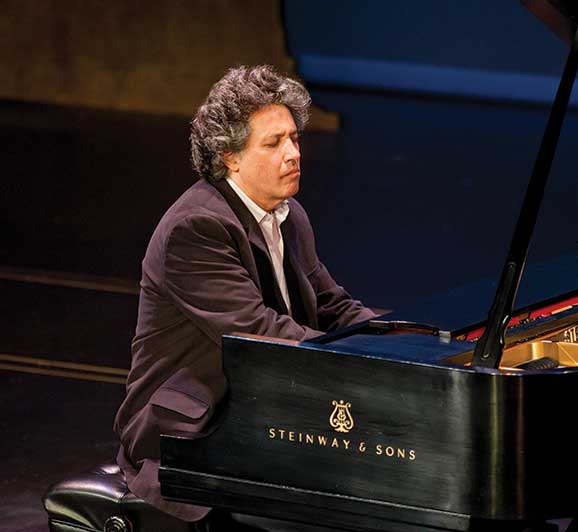John Davis

When John Davis ’75 was 10 years old, his older brother, Ned Davis ’72, brought home an album that forever changed his life. From the first song, “Help Me,” the classic hit on Mississippi blues legend Sonny Boy Williamson’s More Real Folk Blues, young Davis was hooked. It began a four-decade love affair that has taken Davis, a North Carolina-born classical pianist, deep into the annals of Black culture, specifically researching, writing, archiving and playing the music of forgotten enslaved composers. “I was knocked out by the sheer power of that sound, transported really,” he recalls. “Up to then, I thought the only kind of music that had that kind of genius, virtuosity and earthy directness was Beethoven and Chopin.”
In that moment, Davis vowed to learn everything he could about blues culture, which included listening to and collecting all kinds of Black music, including urban and country blues, soul, funk, gospel and their predecessors: spirituals, work songs and various tunes of the slave period. “By the time I went to Exeter, I must have collected around 1,000 records,” he says. “My poor father hauled all my stuff back and forth every year. Back then, there was nothing to do in Exeter on Saturday nights, so we would sit around our dorm rooms and spin discs. I remember listening to Memphis Slim and Willie Dixon at Langdell, blasting the music with friends up to 11 p.m. Luckily, I never got in trouble.”
After the Academy, Davis attended Brown University, in part because Providence had an impressive blues culture and many top blues artists played in town. During the day, he studied Russian history and Russian literature. At night, he went to hear the blues.
After graduating from The Juilliard School, where he studied piano, his career excavating and disseminating obscure African American roots musical masters deepened. Davis grows emotional remembering one watershed day: “I was in the library of Juilliard reading Keyboard Music of Black Composers: A Bibliography, and I looked up this guy named Blind Tom, whose real name is Thomas Wiggins. He was an enslaved pianist and one of the first well-known early American pianists of any back- ground. I realized that a few pieces written by him were at Lincoln Center, so I ran across the street. I thought this would be nice music to program, learn and play. What I didn’t know then was that this would launch me on a 30-year odyssey.”
In 1999, he recorded the groundbreaking album John Davis Plays Blind Tom as a tribute to the great pianist. He has also curated several exhibitions, including a 2017 show at Brown featuring the sheet music of Wiggins and other obscure early American Black composers.
This year, the 64-year-old was one of 26 international artists to receive the Rome Prize, given by the American Academy in Rome to support innovative and cross-disciplinary work in the arts and humanities. The prize came at an auspicious time, he says. Last summer, after 25 years of research, Davis recorded a 22-piece album. It features a piece by master pianist Basile Barès, the first published slave composer, and Louis Moreau Gottschalk, a New Orleans creole piano prodigy, among others. He is currently curating a companion exhibit for the New Orleans Jazz Museum, slated to open next spring. “I thought, if I won, I would write a book about the stream of early African American pianists and pianists influenced by Black music and Black culture,” he explains. “Now I am going to work on the New Orleans project.”
“I am not sure I would have been as happy just playing Chopin and Beethoven, as much as I love that music,” he says. “Unearthing and sharing forgotten early African American piano works feels more historically relevant and is a better reflection of who I am as an American artist. I am honored to play a part in bringing this unfairly neglected music to the general public.”
– Sandra Guzmán
Editor’s note: This feature first appeared in the summer 2022 issue of The Exeter Bulletin.


